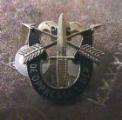Dear SWJ Crew,
I'm a historian currently writing a biography of counterinsurgency pioneer Charles Bohannan (1914-1982). Along with Edward Lansdale and Ramon Magsaysay, Bohannan was a critical player who contributed to the defeat of the Huk rebellion in the Philippines (1946-1954) before becoming involved with Lansdale's efforts in Vietnam.
I was hoping folks here might offer suggestions on either books or journal articles regarding both the Huk rebellion and also guerrilla warfare in the Philippines during the Second World War. Bohannan was involved with many guerrilla groups after being smuggled to the islands before the unleashing of the Battle of Leyte Gulf. I'm most interested in service articles from the era (1945-1960) that discussed the Huk campaign, but am also generating a healthy bibliography on the subject of both Guerrilla Warfare in the Philippines (1939-1960) as well as the Huk rebellion specifically.
I'd also thought I'd ask if folks here could fathom a guess why the defeat of the Huk rebellion has not garnered the same attention today from modern COIN practitioners and theorists compared to work on Algeria, Vietnam, and Malaya. Given that it was a joint American/Filipino success story, I find this somewhat odd (though it is good to see Bohannan's book COUNTER GUERRILLA OPERATIONS: THE PHILIPPINE'S EXPERIENCE is back in print).
Thanks in advance for your .02 cents
Jay Ridler, Ph.D.
Visiting Scholar, University of California, Berkeley.









Bookmarks